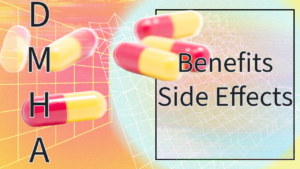In the realm of pre-workout supplements, DMAA and DMHA have emerged as central figures, known primarily for their unparalleled ability to enhance energy and focus.As these stimulants vie for dominance in the fitness community, a critical question arises: Is DMHA or DMAA stronger? This query not only encompasses their stimulation potency but also delves into the broader spectrum of effectiveness, incorporating factors such as DMHA pre workout benefits, the legendary stimulant Jack3d, and the renowned formulation Mesomorph. Given that both DMAA and DMHA inhibit the reuptake of dopamine and norepinephrine, thereby amplifying feelings of motivation, euphoria, and alertness, their competitive edge in the market of pre-workout aids is undeniably pronounced.
However, the path to choosing between these powerful stimulants is fraught with considerations beyond mere performance enhancement. The safety and legality of DMHA and DMAA are subjects of considerable debate, largely because neither is approved by the FDA for dietary supplements. Moreover, the World Anti-Doping Agency’s ban on these substances for athletes adds another layer of complexity to their use. Consumers seeking to buy DMHA or explore the benefits of a DMHA fat burner must tread carefully, mindful of both the exhilarating promises and the potential risks. This article aims to dissect these compelling compounds, offering readers a comprehensive perspective on their strengths, drawbacks, and the overall question of “is DMHA safe?” amidst the broader evaluation of their utility and compliance.

What is DMHA?
DMHA, known by many names including 1,5-Dimethylhexylamine, 2-Amino-5-Methylheptane, or Octodrine, is a compound that can be synthetically produced or derived from natural sources such as the Juglans Regia tree. This stimulant operates by increasing the uptake of dopamine and norepinephrine, neurotransmitters that play a key role in enhancing energy, focus, and the body’s fight or flight response. Initially used as a decongestant in medical contexts, DMHA has found its way into dietary supplements, particularly pre-workouts and fat burners, due to its ability to improve performance, increase weight loss, and suppress appetite.
- Legal Status and Availability: Despite being commercially available in the United States, the FDA considers DMHA to be an illegal product for use in dietary supplements. This legal ambiguity places it in a unique position in the market, especially when compared to DMAA, which faces stricter regulations.
- Potency and Combination Effects: On a milligram-for-milligram basis, DMHA is approximately two to three times less potent than DMAA. However, when combined with Eria Jarensis, a plant extract, it can mimic the effects of DMAA, offering users a similar experience in terms of energy and focus.
- Applications and Health Considerations: DMHA is predominantly found in pre-workout and fat burner supplements. Its efficacy in enhancing cognitive functions, boosting energy levels, and supporting weight loss has made it a popular choice among hardcore users. Nevertheless, potential users should be aware of its side effects, which might include heart attack and death, similar to those associated with DMAA. Special caution is advised for individuals with high blood pressure, glaucoma, heart arrhythmias, or those who are pregnant or breastfeeding.
In summary, DMHA stands out for its versatility in enhancing workout performance and aiding in weight loss. However, its legal status, potential health risks, and the need for careful consideration of dosage and combinations with other supplements highlight the importance of informed use within the fitness community.
Alternative Names for DMHA
| 1,5-Dimethylhexylamine | Octodrine | 1,5-DMHA |
| 2-amino-6-methylheptane | Amidrine | 2-amino-5-methylheptane |
| 6-Amino-2-methylheptane | Vaporpac | 2-aminoisoheptane |
| 2-Heptylamine, 6-methyl- | 2-Metil-6-amino-eptano | 2-Isooctyl amine |
Best DMHA Supplements

Racer Ephedra offers the best online store for buying DMHA supplements. Find the lowest prices and largest selection of legal products.
What is DMAA?
DMAA, also recognized as 1,3-dimethylamylamine or Geranium Extract, emerged as a significant stimulant in the dietary supplement industry, initially utilized as a nasal decongestant in the 1940s before being reintroduced in 2006 under the guise of a natural compound derived from the geranium plant. Despite claims of its natural origins, subsequent research has conclusively shown that DMAA is synthetically produced, debunking the notion that it is extracted from the geranium plant. This revelation has significant implications, especially considering the substance’s potency and effects on human physiology.
- Potency and Effects: DMAA is known for its strong stimulant effects, which are achieved at lower doses compared to DMHA. Typically, DMAA doses hover around 50 mg, contrasting with the 100 mg to 200 mg range for DMHA. Its mechanism of action includes mimicking human hormones like adrenaline, thereby activating the body’s fight-or-flight response. This results in increased energy, alertness, and concentration, while also suppressing appetite and enhancing fat burning by acting as a vasoconstrictor.
- Safety and Regulatory Status: The potent effects of DMAA have not gone unnoticed by regulatory bodies. It is banned in sports by the World Anti-Doping Agency and is prohibited in the EU and USA due to its structural similarity to amphetamines. This classification stems from concerns over its safety, particularly regarding cardiovascular health. DMAA narrows blood vessels and arteries, potentially leading to severe cardiovascular issues such as high blood pressure, arrhythmias, and even heart attacks, in addition to neurological and psychological conditions.
DMAA’s journey from a nasal decongestant to a controversial dietary supplement highlights the complexities surrounding synthetic stimulants. Its potent effects and associated health risks underscore the importance of regulatory oversight and consumer awareness. Despite its popularity in certain circles for enhancing athletic performance, weight loss, and cognitive function, the legal and health implications of DMAA use cannot be overlooked, with many countries banning its inclusion in supplements.
Alternative Names for DMAA
| 1,3-DMAA | 1,3-Dimethylamylamine | 1,3-Dimethylpentylamine |
| 2-Amino-4-methylhexane | 2-Hexanamine, 4-methyl- (9CI) | 4-Methyl-2-hexanamine |
| 4-Methyl-2-hexylamine | Dimethylamylamine | Geranamine |
| Methylhexanamine | Methylhexanenamine |
Comparing DMHA and DMAA Effects
When comparing the effects of DMAA and DMHA, it’s crucial to understand their similarities and differences in terms of potency, dosage, and sources. Here’s a detailed analysis:
- Potency and Dosage
- DMAA is approximately two to three times stronger per milligram than DMHA, making it a more potent stimulant on a per-milligram basis.
- Common dosages for these stimulants reflect their difference in potency: DMAA is typically dosed around 50 mg, while DMHA dosages range between 100 mg and 200 mg.
- Sources
- DMAA is often associated with Geranium Extract and is also known as 1,3 DMAA. On the other hand, DMHA can be found in a variety of natural sources, including English Walnut Extract, Juglans Regia Extract, Octodrine, and Kigelia Africana Extract.
- The naming conventions also differ; DMAA was sometimes referred to as Geranium Extract, whereas DMHA is known by names such as English Walnut, Juglans Regia, Octodrine, or Kigelia Africana Extract.
- User Experiences
- While both DMAA and DMHA inhibit the reuptake of dopamine and norepinephrine, leading to increased feelings of motivation, euphoria, and wakefulness, users report distinct experiences with each.
- DMAA is often described as providing a more euphoric “kick,” which may be attributed to its higher potency. In contrast, DMHA is praised for its ability to provide strong focus and motivation, making it a preferred choice for those seeking mental clarity and endurance during workouts.
Both DMAA and DMHA have their unique attributes and potential health considerations. They increase blood pressure, which could lead to cardiovascular health issues, underscoring the importance of using these stimulants with caution. Despite their benefits in enhancing energy, alertness, and euphoria, the potency of DMHA is within an order of magnitude of DMAA, suggesting that while DMAA may offer a more intense experience, can still provide significant stimulation for DMHA pre-workout or fat-burning purposes. This comparison highlights the need for users to carefully consider their personal health, desired outcomes, and sensitivity to stimulants when choosing between DMAA and DMHA.
DMHA Products
| Product | Type |
| Jack3D | Pre Workout |
| Ultimate Orange | Pre Workout |
| Hydroxyelite | Fat Burner |
| Lipodrene | Fat Burner |
| Oxyelite Pro | Fat Burner |
| Wicked | Pre Workout |
| Lipodrene Elite | Fat Burner |
| Fastin | Fat Burner |
Pre-Workout Buying Guide

Racer Ephedra delivers the Pre-Workout Buying Guide. Understand key ingredients, best products, and greatest deals to increase workout performance.
Safety and Legality
Safety and Legality
- Legal Status and Regulatory Concerns:
- DMAA and DMHA are not controlled substances in the United States, yet their inclusion in products marketed as dietary supplements is illegal.
- The FDA has taken a clear stance, considering supplements containing DMAA to be illegal and has linked its use to several reports of serious, life-threatening side effects.
- DMHA, similarly, is considered adulterated under the Federal Food, Drug, and Cosmetic Act (FD&C Act) because it does not qualify as a dietary ingredient.
- Both DMAA and DMHA have been banned by the World Anti-Doping Agency (WADA) and are not approved by the FDA for inclusion in dietary supplements, emphasizing the need for consumer vigilance.
- Health Risks and Side Effects:
- Consuming DMAA can raise blood pressure and lead to cardiovascular problems ranging from shortness of breath and tightening in the chest to heart attack.
- DMHA is POSSIBLY UNSAFE when taken by mouth and might have side effects similar to DMAA, including heart attack and death.
- Both substances can cause side effects such as increased blood pressure, stress response, nausea, vomiting, and mood swings if taken in excess.
- DMAA has been linked to severe health risks, including fatal outcomes, especially when misused or mixed with other substances.
- Consumer Advice:
- It is essential to be cautious when purchasing DMHA or DMAA products, as many online sellers may not provide genuine ingredients.
- Consumers should look for DMAA listed on product labels under various names, including 1,3-DMAA, Geranamine, or Methylhexanamine, to ensure they are informed about what they are consuming.
- The FDA advises consumers not to buy or use products marketed as dietary supplements that contain DMAA due to the health risks they present.
- For those considering DMHA or DMAA supplements, it’s crucial to consult healthcare professionals and consider third-party certification seals from organizations such as BSCG, USP, NSF, or Informed Sport as a safer choice.

User Experiences and Expert Opinions
When delving into user experiences and expert opinions regarding the use of DMHA and DMAA, it’s crucial to consider the following aspects based on cited information:
- Side Effects:
- Both DMHA and DMAA can lead to increased heart rate, blood pressure, stress response, nausea, vomiting, and mood swings when consumed in excessive amounts. This underscores the importance of adhering to recommended dosages and consulting healthcare professionals before incorporating these stimulants into a fitness or weight loss regimen.
- Applications in Supplements:
- DMAA, DMHA, and DMBA are identified as pharmacologically active substances in dietary supplements aimed at weight loss, performance enhancement, and libido stimulation. Their presence in these products highlights their perceived effectiveness in these areas, though it also raises concerns regarding potential side effects and the need for careful consumption.
- Pharmacological Effects and Dosage:
- As sympathomimetics, DMAA, DMHA, and DMBA affect the sympathetic nervous system, with pharmacological effects potentially occurring from oral doses as low as 4 mg daily. This information is critical for users and healthcare professionals alike in determining safe and effective dosages, especially considering the potent nature of these substances and their impact on the body’s physiological processes.
Understanding these key points can help users make informed decisions about using DMHA and DMAA, balancing the benefits of enhanced performance and weight loss against the potential risks associated with their consumption.
Fat Burning Buying Guide

Racer Ephedra reviews the best fat burning ingredients and products in one ultimate Fat Burning Buying Guide.
Pre-Workout Formulations for Bodybuilders
1,3-Dimethylamylamine (DMAA), also known as methylhexanamine, gained popularity as a key ingredient in dietary supplements, particularly in pre-workout formulations targeted at bodybuilders. This stimulant, once marketed as “geranium extract,” rose to prominence after the Dietary Supplement Health and Education Act of 1994 (DSHEA). However, its status as a New Dietary Ingredient (NDI) led to scrutiny from the Food and Drug Administration (FDA).
In 2012, the FDA took decisive action against DMAA, issuing warning letters to manufacturers and distributors. The agency called for the cessation of DMAA sales and its removal from dietary supplement formulations, citing a lack of required safety data. Consequently, supplements containing DMAA were labeled as “adulterated.” This regulatory intervention was prompted by adverse event reports associated with DMAA consumption.
Despite widespread anecdotal claims of enhanced exercise performance and improved focus, scientific evidence supporting DMAA’s efficacy as an ergogenic aid remains elusive. The compound’s safety profile is further complicated by reports linking its ingestion to adverse events. However, it’s important to note that in many of these cases, DMAA was used in combination with other dietary ingredients, prescription medications, or recreational drugs, making it challenging to establish a direct causal relationship.
While the use of DMAA has significantly decreased following regulatory actions, some dietary supplements containing DMAA or its close derivatives continue to be available in the market. This persistence underscores the ongoing debate surrounding DMAA’s safety and efficacy, highlighting the need for continued research and regulatory vigilance in the dynamic landscape of dietary supplements.
DMAA Physiological and Performance Effects
1,3-Dimethylamylamine (DMAA) is a controversial stimulant that has been used in pre-workout supplements and weight loss products. Despite its popularity, scientific evidence on DMAA’s physiological and performance effects remains limited. A study by Bloomer et al. examined DMAA’s acute impact on cardiovascular function, finding minimal changes in resting heart rate, blood pressure, and body temperature over 24 hours following a 25 mg dose. For instance, mean heart rate fluctuated between 61-65 beats per minute, while systolic blood pressure ranged from 115-120 mmHg during the initial 8-hour post-ingestion period.
Regarding physical performance, contrary to anecdotal reports of enhanced energy and focus, the sole human study on DMAA’s ergogenic effects found no significant improvement. Bloomer and colleagues observed that DMAA, alone or combined with caffeine, did not enhance 10 km running performance compared to placebo. Heart rates during exercise were similar across conditions (179-182 bpm), and perceived exertion was unchanged.
Interestingly, a small study by Powers et al. suggested potential cognitive benefits from a DMAA-containing supplement. Participants demonstrated improved reaction time and cognitive efficiency. However, these findings cannot be attributed solely to DMAA, as the supplement contained caffeine and other ingredients.
Safety concerns persist due to DMAA’s stimulant properties and reported adverse events. The lack of long-term studies and inconsistent product formulations further complicate risk assessment. While some users report positive experiences, scientific evidence supporting DMAA’s efficacy for weight loss or performance enhancement remains inconclusive.
While DMAA has garnered attention in the fitness community, current research provides limited support for its purported benefits. More rigorous, long-term studies are needed to fully understand its physiological effects, potential performance benefits, and safety profile. Until then, consumers and health professionals should approach DMAA use with caution, weighing the uncertain benefits against potential risks.
Conclusion
Through this comprehensive analysis, the potency, applications, and legal standings of DMHA and DMAA have been thoroughly examined, offering insights into their impact on the fitness community. While both stimulants exhibit remarkable abilities to enhance energy, focus, and performance, their legal ambiguities and associated health risks underscore the importance of informed usage. The exploration into their mechanisms, user experiences, and regulatory concerns highlights the balance users must navigate between seeking performance enhancement and ensuring personal health and safety.
Ultimately, the choice between DMHA and DMAA should be approached with caution, bearing in mind their potential cardiovascular risks and the strict regulations surrounding their use. As the fitness and dietary supplements landscape continues to evolve, the insights gained from this study advocate for continued research and a prudent approach to incorporating such powerful stimulants into one’s regimen. It is crucial for consumers to remain vigilant, seeking professional advice and prioritizing safety over temporary gains, as they strive for optimal health and performance outcomes.
References
Catalani, Valeria, Mariya Prilutskaya, Ahmed Al-Imam, Shanna Marrinan, Yasmine Elgharably, Mire Zloh, Giovanni Martinotti, Robert Chilcott, and Ornella Corazza. 2018. “Octodrine: New Questions and Challenges in Sport Supplements” Brain Sciences 8, no. 2: 34. https://doi.org/10.3390/brainsci8020034
DMHA in Dietary Supplements https://www.fda.gov/food/information-select-dietary-supplement-ingredients-and-other-substances/dmha-dietary-supplements
DMAA in Products Marketed as Dietary Supplements https://www.fda.gov/food/information-select-dietary-supplement-ingredients-and-other-substances/dmaa-products-marketed-dietary-supplements
Schilling, B.K., Hammond, K.G., Bloomer, R.J. et al. Physiological and pharmacokinetic effects of oral 1,3-dimethylamylamine administration in men. BMC Pharmacol Toxicol 14, 52 (2013). https://doi.org/10.1186/2050-6511-14-52
1,3-Dimethylamylamine (DMAA): A Brief History and Review of Anecdotal and Laboratory Findings Bloomer RJ, et al., J Altern Complement Integr Med 2018, 4: 057
DOI: 10.24966/ACIM-7562/100057



